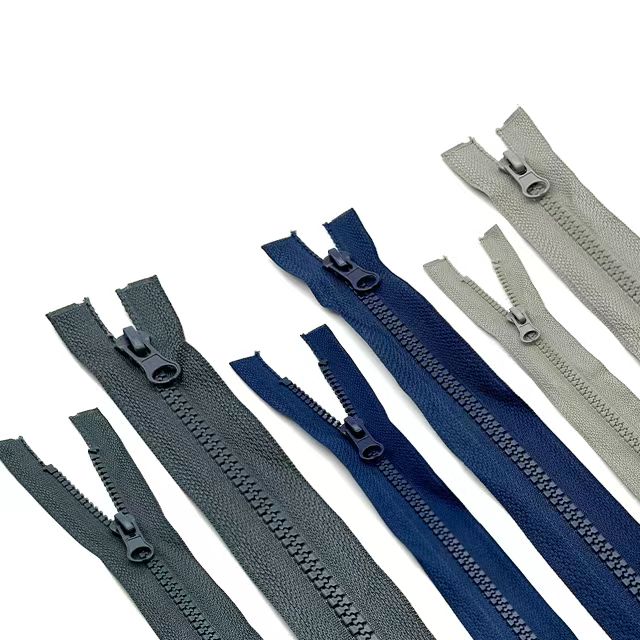The production process of resin zipper
Update time:2025.04.18 Views:971
The production process of resin zipper
The raw material preparation stage is the foundation of production. The main raw materials include polyester (PET) or polyoxymethylene (POM) resin particles, which have good wear resistance and formability. At the same time, high-quality webbing and pulls need to be prepared. The webbing is usually made of polyester fiber and undergoes strict tensile strength testing.
Mold design and manufacturing are core technical processes. Engineers use CAD software to design the precise shape of zipper teeth, with each tooth's size error controlled within 0.01 millimeters. The mold is made of special steel processed by CNC machine tools, and the surface is precision polished to ensure that the formed zipper teeth are smooth and free of burrs.
Injection molding is a crucial manufacturing step. The resin particles are fed into the injection molding machine and heated to 200-280 ℃ to melt, and then injected into the mold under high pressure. After cooling and shaping, rows of resin teeth are formed. During this process, the control of temperature, pressure, and time is crucial and directly affects the quality of the product.
The assembly process perfectly combines various components. The automatic assembly machine evenly implants the formed resin teeth into the edge of the webbing, and then installs the pull tab. Each process is equipped with an optical inspection system that automatically eliminates defective products. Finally, after lubrication treatment, the zipper slides more smoothly.
Quality inspection ensures product reliability. Including multiple tests such as tensile testing, abrasion resistance testing, and color fastness testing. High quality resin zippers should be able to withstand more than 5000 opening and closing tests and maintain stable performance within a temperature range of -20 ℃ to 60 ℃.
The raw material preparation stage is the foundation of production. The main raw materials include polyester (PET) or polyoxymethylene (POM) resin particles, which have good wear resistance and formability. At the same time, high-quality webbing and pulls need to be prepared. The webbing is usually made of polyester fiber and undergoes strict tensile strength testing.
Mold design and manufacturing are core technical processes. Engineers use CAD software to design the precise shape of zipper teeth, with each tooth's size error controlled within 0.01 millimeters. The mold is made of special steel processed by CNC machine tools, and the surface is precision polished to ensure that the formed zipper teeth are smooth and free of burrs.
Injection molding is a crucial manufacturing step. The resin particles are fed into the injection molding machine and heated to 200-280 ℃ to melt, and then injected into the mold under high pressure. After cooling and shaping, rows of resin teeth are formed. During this process, the control of temperature, pressure, and time is crucial and directly affects the quality of the product.
The assembly process perfectly combines various components. The automatic assembly machine evenly implants the formed resin teeth into the edge of the webbing, and then installs the pull tab. Each process is equipped with an optical inspection system that automatically eliminates defective products. Finally, after lubrication treatment, the zipper slides more smoothly.
Quality inspection ensures product reliability. Including multiple tests such as tensile testing, abrasion resistance testing, and color fastness testing. High quality resin zippers should be able to withstand more than 5000 opening and closing tests and maintain stable performance within a temperature range of -20 ℃ to 60 ℃.
From raw materials to finished products, the birth of a resin zipper embodies multiple technologies in materials science, mechanical engineering, and precision manufacturing. It is precisely these rigorous techniques that have created this seemingly simple yet indispensable practical invention in our daily lives.



